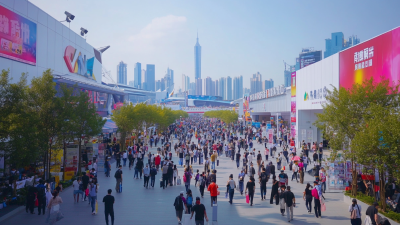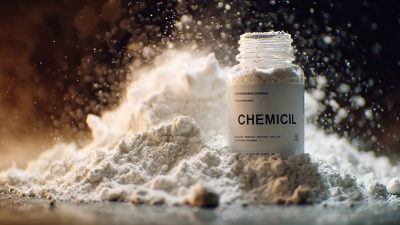
7 Best Strategies for Sourcing High-Quality Pharmaceutical Intermediates in 2023
In the ever-evolving pharmaceutical landscape, the sourcing of high-quality pharmaceutical intermediates has become a critical factor for success. According to a recent report by the Global Pharmaceutical Intermediates Market, the industry is anticipated to experience a CAGR of 6.9% from 2021 to 2028, driven by escalating demand for advanced drug formulations and the rise of custom synthesis solutions.
 Pharmaceutical intermediates, which serve as essential building blocks in the production of active pharmaceutical ingredients (APIs), play a pivotal role in ensuring the efficacy and safety of finished products. As regulatory requirements become more stringent and competition intensifies, adopting effective sourcing strategies for these intermediates is paramount. This blog will explore the seven best strategies for sourcing high-quality pharmaceutical intermediates in 2023, empowering stakeholders to navigate the complexities of the global market and enhance their product offerings.
Pharmaceutical intermediates, which serve as essential building blocks in the production of active pharmaceutical ingredients (APIs), play a pivotal role in ensuring the efficacy and safety of finished products. As regulatory requirements become more stringent and competition intensifies, adopting effective sourcing strategies for these intermediates is paramount. This blog will explore the seven best strategies for sourcing high-quality pharmaceutical intermediates in 2023, empowering stakeholders to navigate the complexities of the global market and enhance their product offerings.
Identifying Reliable Suppliers: Evaluating Pharmaceutical Intermediates in 2023
Identifying reliable suppliers for pharmaceutical intermediates is crucial for maintaining the quality and safety of pharmaceutical products. In 2023, the landscape for sourcing these intermediates has evolved, making it essential to adopt a systematic approach. Begin by evaluating potential suppliers based on their certifications and compliance with industry regulations. A supplier with certifications such as GMP (Good Manufacturing Practices) not only indicates adherence to quality standards but also minimizes risks related to product contamination and inconsistency.
Tips for assessing suppliers include visiting their manufacturing facilities, if possible, to gauge the cleanliness and organization of their operations. Additionally, consider requesting samples of the intermediates to conduct your own quality tests before committing to a large order. Collaboration with suppliers that prioritize transparency in their manufacturing processes can significantly enhance your supply chain reliability. Lastly, leverage online platforms and industry forums to gather reviews and feedback from other pharmaceutical companies about their experiences with specific suppliers.
Furthermore, a supplier’s track record in terms of delivery performance and their ability to meet deadlines is another vital aspect to assess. Establishing a long-term relationship with a supplier who demonstrates consistent reliability can lead to better pricing terms and more favorable conditions in the future. Investing time in finding the right partner can save resources and ensure that your pharmaceutical products meet the expected standards.
7 Best Strategies for Sourcing High-Quality Pharmaceutical Intermediates in 2023
| Strategy | Description | Key Considerations | Reliability Score (Out of 10) |
|---|---|---|---|
| Supplier Audits | Conduct on-site assessments to verify supplier capabilities. | Assess facility conditions and compliance with regulations. | 9 |
| Supplier Certification | Verify certifications like GMP, FDA approvals. | Ensure ongoing compliance with industry standards. | 8 |
| Request for Proposals (RFPs) | Issue RFPs to gather competitive bids from various suppliers. | Evaluate proposals based on quality and price. | 7 |
| Quality Control Testing | Implement rigorous testing of intermediates for purity and efficacy. | Establish clear testing protocols and benchmarks. | 9 |
| Networking and Recommendations | Leverage industry connections to find reputable suppliers. | Gather insights from peers and industry experts. | 8 |
| Market Research | Conduct thorough research on supplier histories and backgrounds. | Look for customer feedback and past performance metrics. | 7 |
| Collaboration with Experts | Engage consultants or industry experts for insights on intermediates. | Ensure that experts have a good reputation in the field. | 9 |
Leveraging Regulatory Compliance: Navigating Global Standards for Pharmaceutical Sourcing
In 2023, as the pharmaceutical industry continues to navigate the complexities of sourcing high-quality intermediates, regulatory compliance stands out as a focal point. The global pharmaceutical regulatory affairs market is projected to reach USD 14.34 billion by 2030, growing at a CAGR of 7.17% from 2025 to 2030, indicating an increasing emphasis on meeting stringent global standards. This necessity enhances the role of Contract Development and Manufacturing Organizations (CDMOs), which are vital for drug discovery and production. By outsourcing to CDMOs, pharmaceutical companies can streamline processes, reduce costs, and ensure adherence to the latest regulatory requirements.
Moreover, as the market for comparator drug sourcing evolves, the demand for efficient and compliant sourcing strategies has grown. The ongoing focus on enhancing local production capabilities reinforces the importance of current Good Manufacturing Practices (cGMP). Countries like India are taking initiatives to strengthen the capacity of small and medium-sized pharmaceutical enterprises, positioning themselves as key players in meeting global health standards. Such efforts are crucial for ensuring quality assurance and broadening access to quality medicines worldwide, especially within the framework of international regulations.
7 Best Strategies for Sourcing High-Quality Pharmaceutical Intermediates in 2023
Utilizing Technology: How AI and Data Analytics Enhance Pharmaceutical Sourcing Efficiency
In the rapidly evolving pharmaceutical landscape, leveraging technology has become paramount for sourcing high-quality intermediates. Artificial intelligence (AI) and data analytics are at the forefront of this transformation, offering innovative solutions to enhance sourcing efficiency. By processing vast datasets, AI can identify trends, predict market movements, and optimize supplier selections, enabling pharmaceutical companies to make informed decisions. This not only streamlines the sourcing process but also minimizes risks associated with quality and compliance.
Furthermore, data analytics plays a crucial role in real-time inventory management and supply chain optimization. By analyzing historical data and current market conditions, companies can forecast demand more accurately and adjust their sourcing strategies accordingly. This proactive approach ensures that pharmaceutical firms can maintain a steady supply of intermediates while reducing excess inventory costs. Overall, the integration of AI and data analytics into the sourcing process fosters greater efficiency, cost-effectiveness, and reliability in the procurement of pharmaceutical intermediates, ultimately contributing to better patient outcomes.

Assessing Quality Control Measures: Standards and Certifications for Intermediates
The pharmaceutical industry places immense importance on quality control measures for intermediates, particularly as the demand for high-quality products continues to rise. In 2023, adherence to established standards and certifications is critical for ensuring the efficacy and safety of pharmaceutical intermediates. According to a report by the International Society for Pharmaceutical Engineering (ISPE), 67% of industry leaders emphasized that robust quality management systems are essential for maintaining product integrity. This highlights the necessity for manufacturers to implement stringent quality checks throughout the sourcing process.
Moreover, certifications such as Good Manufacturing Practices (GMP) and ISO 9001 are vital benchmarks for assessing the quality of pharmaceutical intermediates. A 2022 survey by QYResearch revealed that 82% of pharmaceutical companies are prioritizing partnerships with suppliers that possess these certifications. Compliance with these standards not only assures product quality but also mitigates risks associated with supply chain disruptions and non-compliance issues. As the industry evolves, companies focusing on certified suppliers are likely to gain a competitive edge, ensuring their intermediates meet regulatory requirements and contribute to the overall success of their product offerings.
Market Trends and Pricing Strategies: Understanding the Economics of Pharmaceutical Intermediates in 2023
In 2023, understanding the economics of pharmaceutical intermediates is crucial for sourcing high-quality materials efficiently. The Indian pharmaceutical industry is poised for significant growth, bolstered by a strong market presence and an increasing global reputation. This growth is influenced by a shift in economic dynamics, where India is becoming a vital player in the global pharmaceutical supply chain. As costs rise and reimbursement becomes more complex, companies need to adopt strategic sourcing techniques to minimize expenses while maintaining the quality of intermediates.
Market trends indicate a strong inclination towards innovative procurement strategies, facilitated by advances in technology and shifts in global trade patterns. The evolving relationship between India and China presents new opportunities for trade and investment, emphasizing the importance of adaptability in pricing strategies. Companies that can harness these trends and align them with their sourcing practices stand to benefit significantly, as the market continues to demand high-quality intermediates at competitive prices. With the pharmaceutical landscape rapidly changing, prioritizing quality and adaptability will be key to success in 2023 and beyond.

Related Posts
-

Navigating the Future of Best Pharmaceutical Materials in 2025 and How to Stay Ahead
-

Pharma Material Spotlight: Record Attendance and Opportunities at the 137th Canton Fair 2025
-

Solutions for Sourcing the Best Pharma Materials in the Industry
-

Navigating Issues with Sourcing Best Pharmaceutical Chemical Powder in a Competitive Market
-

Discovering Reliable Supply Chains for Drug Raw Materials in a Competitive Global Market
-

7 Essential Insights for Global Buyers of Pharmaceutical Raw Materials
